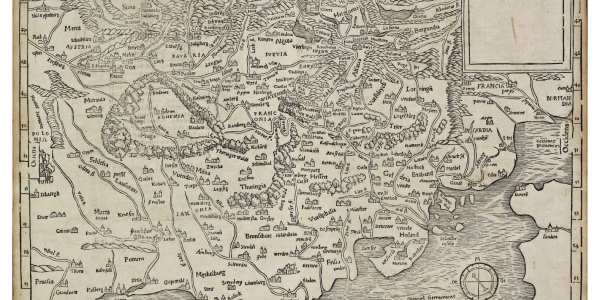New research from graduate student Justin Meyer shows how German Renaissance humanist writers mobilized ancient, medieval, and Renaissance-era knowledge in shaping German identity.

Some graduate students might find combing through a 16th-century, 12-volume tome tedious, but not doctoral candidate Justin Meyer. He has been busy analyzing the massive Exegesis Germaniae (An Exegesis of Germania) by German humanist Franciscus Irenicus. Often taken at face value as a random and disorganized assortment of information, Meyer wants to prove instead that a classifying logic drove Irenicus’ writing.
“Many historians have written off Irenicus’s approach as just info-dumping,” he said. “But I have tracked how Irenicus used the knowledge available to him at the time to create a coherent internal structure. There is an organizing principle at work in how Irenicus catalogs what the ancient and medieval scholars wrote about the people of Germania.” By bringing many different texts together in one place, Irenicus helps scholars find patterns in the wide variety of understandings of what constituted a German identity in the 16th century. Irenicus offers what Meyer calls a “multi-century genealogy of knowledge.” His book, Meyer argues, is concerned with “how knowledge is produced over time.”
As a present-day historian guided by this tradition, Meyer examines how 16th-century German humanists such as Irenicus studied the intellectuals who preceded them and mobilized their information to create a German identity. German Renaissance humanism is relatively understudied, especially in Anglophone scholarship, when compared to adjacent fields such as German Renaissance art, Italian humanism, and the Italian Renaissance. Renaissance humanists were, at least in their own conception, poet-scholars who devoted themselves to the humanities — in particular the cluster of disciplines that would come to comprise the modern field of Classics.

“Because of the lack of scholarship, I am trying less to change arguments. Rather, I am putting forward an argument about sources and evidence,” Meyer said. “I am developing theories about how knowledge diffused across time, ranging from Julius Caesar, who was one of the main sources for the German humanists, to Sebastian Münster, who serves as the unfixed end-point for my research.” In addition to translating texts by these authors, one of Meyer’s other projects involves tracing how Roman provinces served as spaces for creating historical narratives. These spaces, he argues, “privileged ancient Roman history as vital” in shaping a history of Germania.
Understanding how past and present knowledge shape each other has fostered rewarding classroom conversations for Meyer. In fall 2018, while leading discussion sections for Western Civilization I, an undergraduate student remarked to Meyer that they could see how an ancient document was relevant to the modern world. “That kind of connection is exactly what the humanities are supposed to be,” said Meyer. Teaching has also allowed Meyer to make connections among different academic departments on campus. Inspired by his passion for studying languages, early on in his graduate studies he approached his advisor, Christine Johnson, associate professor of history, about being a TA for a German-language course in the German department. As a result of that collaboration and other teaching opportunities that followed, Meyer has strong ties in the German and classics departments, in addition to history.
Meyer’s interdisciplinary mindset helps him carefully consider how German identity has been constructed, which is fraught terrain given the history and ideology associated with it. As Meyer traces what it meant to be German historically and geographically, terms like nationalism and patriotism mean different things within the context of his research.
“There was no Germany at this time. There were a bunch of fractured small territories under this vague idea of the Holy Roman Empire,” he said. “They couldn't really call upon this idea of a political state and were wrestling with how to define a Germany for themselves because Germany did not exist outside of the minds of a very small population of intellectuals in the Renaissance.” Before WWII, nationalist scholars in Germany sought to export a manufactured identity, creating a teleological connection between themselves and the 16th century.
“I try to be careful and never use the term nationalism because it just didn't exist at this time,” said Meyer. “I prefer the term patriotism.” For Meyer, the term “patriotism” creates enough of a critical distance from the term “nationalism” that it does not immediately conjure up images of 19th- and 20th-century state-based national identity. By looking at how geographical and historical information was read, synthesized, and employed to create a German identity, his approach not only uncovers a multi-century genealogy of knowledge but offers a form of scholarship that accounts for the tricky landscape endemic in writing about the past.





